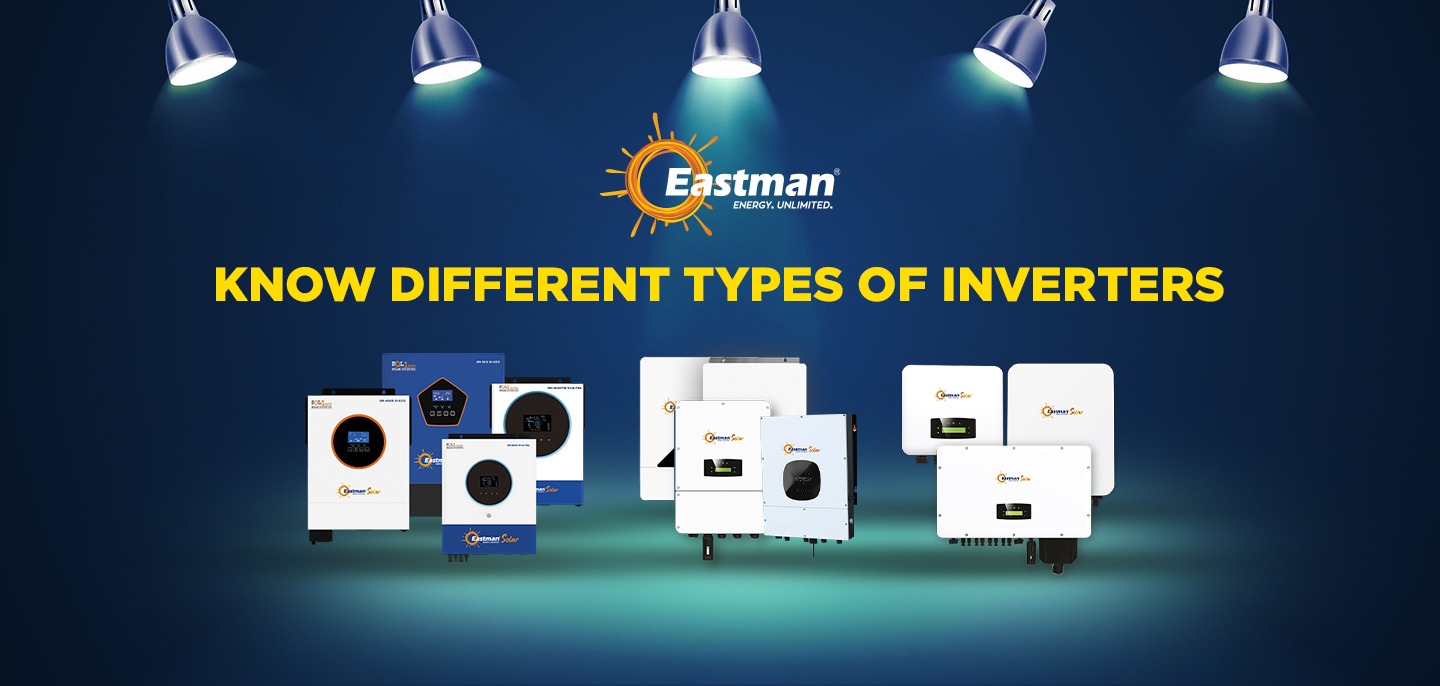
Know different Types of Inverters
As the world moves towards a more sustainable energy future, the demand for renewable energy systems is growing rapidly. Solar power, in particular, is becoming a popular choice for homeowners and businesses looking to reduce their carbon footprint and save on energy costs. However, selecting the right inverter for your solar energy system can be confusing, especially with the variety of options available, such as off-grid inverters, hybrid inverters, and grid-tie inverters. In this blog, we’ll explore these three types of inverters, their key functions, and how to choose the right one for your specific needs.
1. Off-Grid Inverters
What Are Off-Grid Inverters?
Off-grid inverters are used in systems that are completely independent of the main electrical grid. These inverters convert the DC (direct current) power generated by solar panels into AC (alternating current) power, which can be used by household appliances. In an off-grid system, the energy produced by the solar panels is stored in batteries, and the inverter draws from the batteries to provide power when needed.
Key Features of Off-Grid Inverters:
- Battery Dependence: Off-grid inverters rely on a battery bank to store excess solar energy. This makes them ideal for locations that experience frequent power outages or for remote areas where grid access is unavailable.
- Energy Independence: With an off-grid system, you are not reliant on the main utility grid, making you fully energy independent. You can generate and store your own power, allowing for greater self-sufficiency.
- Sizing Considerations: Off-grid inverters need to be sized properly to match the power consumption of the home or facility. They must also be able to manage peak load requirements.
- High Cost and Maintenance: Off-grid systems are generally more expensive due to the need for large battery banks and ongoing maintenance to ensure optimal performance.
Ideal Use Cases: Off-grid inverters are best suited for homes or businesses in remote areas without access to the grid or for those who desire complete energy independence.
2. Hybrid Inverters
What Are Hybrid Inverters?
Hybrid inverters, also known as multi-mode inverters, are designed to work with both grid-connected and off-grid systems. They offer the flexibility of storing energy in batteries while also being connected to the grid. This means that you can use solar power to run your home, store excess energy in batteries for later use, and even feed surplus power back into the grid.
Key Features of Hybrid Inverters:
- Dual Functionality: Hybrid inverters combine the benefits of grid-tied and off-grid systems. They can switch between battery power, solar energy, and grid power depending on the availability of each.
- Battery Storage: Similar to off-grid inverters, hybrid inverters allow for energy storage in batteries, which can be used during power outages or at times of high energy demand.
- Grid Interaction: Hybrid inverters can send excess solar power back to the grid, allowing homeowners to benefit from net metering or feed-in tariff programs.
- Smart Energy Management: Many hybrid inverters come with advanced monitoring systems that allow users to track energy production, consumption, and storage in real time.
Ideal Use Cases: Hybrid inverters are suitable for homeowners who want the flexibility of using stored energy during grid outages while still benefiting from the stability of being connected to the grid. They are ideal for areas where grid power is available but may be unreliable.
3. Grid-Tie Inverters
What Are Grid-Tie Inverters?
Grid-tie inverters are designed for systems that remain connected to the electrical grid. These inverters convert solar power into AC electricity and feed it directly into the grid, allowing homeowners or businesses to reduce their electricity bills by using solar energy when it’s available. Any surplus energy is sent to the grid, and consumers are credited through net metering.
Key Features of Grid-Tie Inverters:
- No Battery Storage: Unlike off-grid and hybrid inverters, grid-tie inverters do not store energy. They rely entirely on the grid to balance energy production and consumption.
- High Efficiency: Grid-tie inverters are known for their efficiency since they only manage the conversion of solar power without the complexities of battery management.
- Feed-in Tariffs and Net Metering: Grid-tie systems allow users to benefit from government incentives such as net metering or feed-in tariffs, where excess energy produced by the solar panels is sent back to the grid for financial compensation.
- Lower Costs: Since there is no need for battery storage, grid-tie inverters are more affordable compared to off-grid or hybrid systems.
Ideal Use Cases: Grid-tie inverters are ideal for homeowners or businesses located in urban or suburban areas with reliable grid access. They are perfect for those who want to lower their electricity bills by generating solar energy without investing in battery storage.
Choosing the Right Inverter for Your Needs
When choosing between off-grid, hybrid, and grid-tie inverters, consider the following factors:
- Grid Availability: If you live in a remote area with no grid access, an off-grid inverter is your best choice. If you have grid access but want backup power, a hybrid inverter is ideal. If your goal is simply to reduce your utility bills, a grid-tie inverter is the most efficient option.
- Energy Independence: For those who prioritize energy independence, off-grid or hybrid inverters are the way to go. Grid-tie inverters offer no energy independence but are more affordable and simpler to maintain.
- Cost Considerations: Off-grid systems are the most expensive due to the need for batteries. Hybrid systems fall in the middle range, while grid-tie systems are the most cost-effective.
- Backup Power Needs: If you need backup power during grid outages, hybrid or off-grid inverters are the best options since grid-tie systems don’t provide power during outages.
Conclusion
Selecting the right inverter is a critical step in building an efficient solar energy system. Off-grid inverters provide complete energy independence, hybrid inverters offer the flexibility of combining grid power and battery storage, and grid-tie inverters deliver maximum efficiency for users who want to reduce their utility bills without the need for batteries.
Whether you are seeking energy independence, reliability, or cost savings, understanding the differences between off-grid, hybrid, and grid-tie inverters will help you make the best decision for your energy needs.
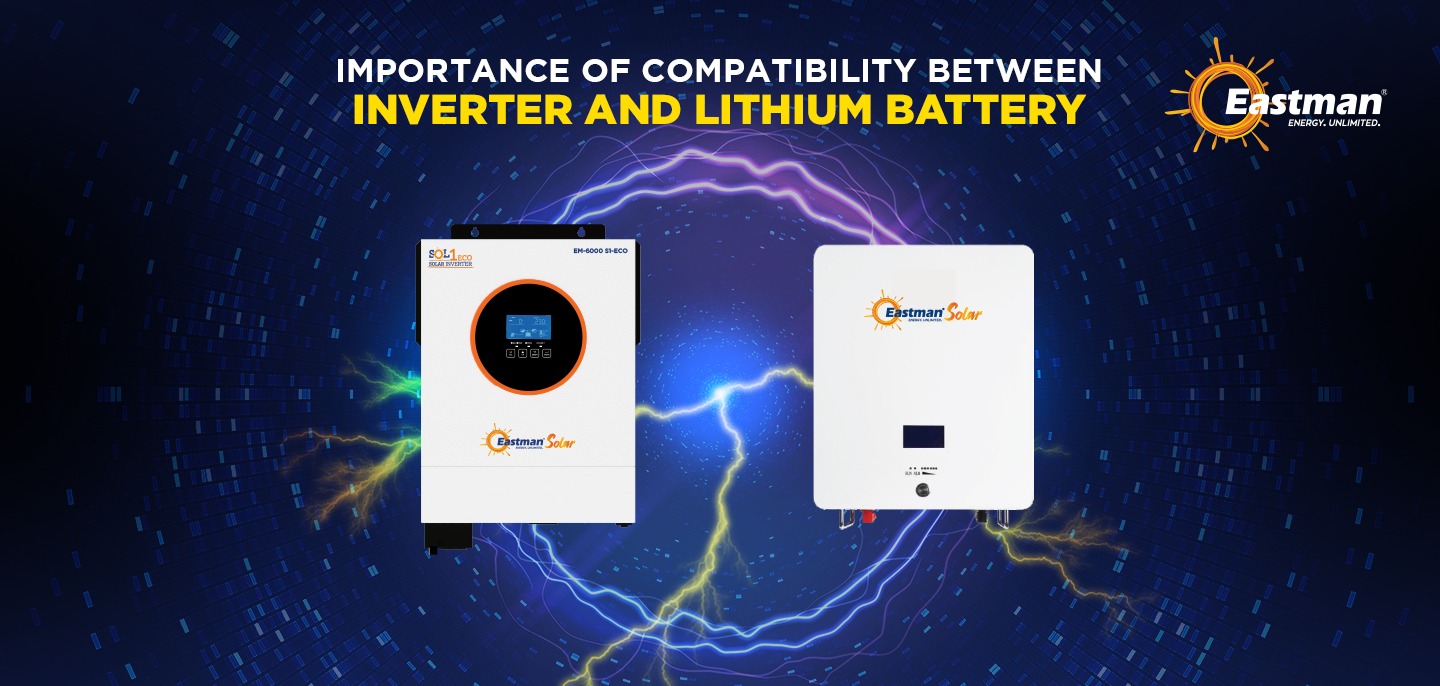
Importance of Compatibility Between Inverter and Lithium Battery
The rise of renewable energy, particularly solar power, has brought significant advancements in energy storage solutions. Among these innovations, lithium batteries have emerged as the preferred choice for backup power due to their efficiency, longevity, and compact design. However, one key factor that determines the overall performance of a power backup system is the compatibility between the inverter and the lithium battery. This compatibility is often overlooked, but it is crucial for achieving optimal performance, safety, and the longevity of both components.
Understanding the Role of Inverters and Lithium Batteries
An inverter is the heart of any backup power system, converting DC (direct current) energy stored in batteries into usable AC (alternating current) energy for household or commercial appliances. On the other hand, lithium batteries store energy and release it when required. Both work in tandem, and if they are not fully compatible, it can lead to inefficiencies, system failures, or even safety hazards.
Why Compatibility Matters
Optimal Performance and Efficiency
The efficiency of an inverter and lithium battery system is maximized when both components are designed to work seamlessly together. Incompatible systems can result in energy losses during the conversion process, reducing the overall efficiency of your energy storage solution. A well-matched inverter and battery will ensure smooth transitions between charging and discharging, minimizing energy wastage.
Longer Battery Life
Lithium batteries are known for their longevity, but their lifespan can be significantly shortened if paired with an incompatible inverter. Inverters that are not designed to work with lithium batteries may overcharge or undercharge the battery, leading to premature degradation. Ensuring compatibility means that the inverter will adhere to the proper charge and discharge rates, extending the life of the battery.
Safety Concerns
Incompatible systems can lead to overloading or overheating, creating potential safety hazards such as fires or battery explosions. Lithium batteries require specific charge controllers that regulate the flow of electricity to prevent such risks. A compatible inverter ensures that the battery management system (BMS) within the lithium battery functions properly, mitigating safety risks.
Cost-Effectiveness
While lithium batteries can be more expensive than traditional lead-acid batteries, their longer lifespan and higher efficiency make them a cost-effective choice in the long run. However, these benefits are only realized when the battery is paired with an inverter that can support its advanced technology. An incompatible inverter may cause frequent breakdowns or inefficient performance, leading to higher maintenance costs and replacement expenses over time.
Better Monitoring and Control
Modern inverters designed for lithium batteries often come equipped with smart technology that allows for better monitoring and control of energy use. These inverters can integrate with the battery’s BMS to provide real-time data on charge levels, usage patterns, and system health. This synergy between the inverter and battery provides homeowners and businesses with valuable insights into their energy consumption, enabling them to make informed decisions to optimize energy usage.
Choosing the Right Inverter and Lithium Battery Pair
When selecting an inverter and lithium battery, it's essential to choose a system where both components are designed to complement each other. Factors such as the battery’s voltage, capacity, and the inverter’s output rating need to be carefully matched to avoid compatibility issues.
Additionally, different lithium batteries have unique charge and discharge requirements, which must be supported by the inverter. Some inverters come with pre-programmed settings specifically tailored for lithium batteries, ensuring optimal charging and performance.
Eastman Inverter and Lithium Battery: A Perfect Match
Eastman offers a range of inverters and lithium batteries designed to work seamlessly together. The company's inverters are engineered to maximize the performance of their lithium batteries, ensuring optimal energy efficiency, safety, and long-term durability. Eastman’s inverters come equipped with advanced battery management systems that prevent overcharging and overheating, providing peace of mind when it comes to safety.
Whether you are setting up a new energy backup system or upgrading an existing one, Eastman’s inverter and lithium battery solutions offer a reliable, efficient, and safe option. With Eastman, you can be confident that your power backup system is operating at peak performance, delivering clean and consistent power whenever you need it.
Choosing Eastman ensures compatibility, safety, and an extended lifespan for your energy backup system, making it a smart investment for your home or business.
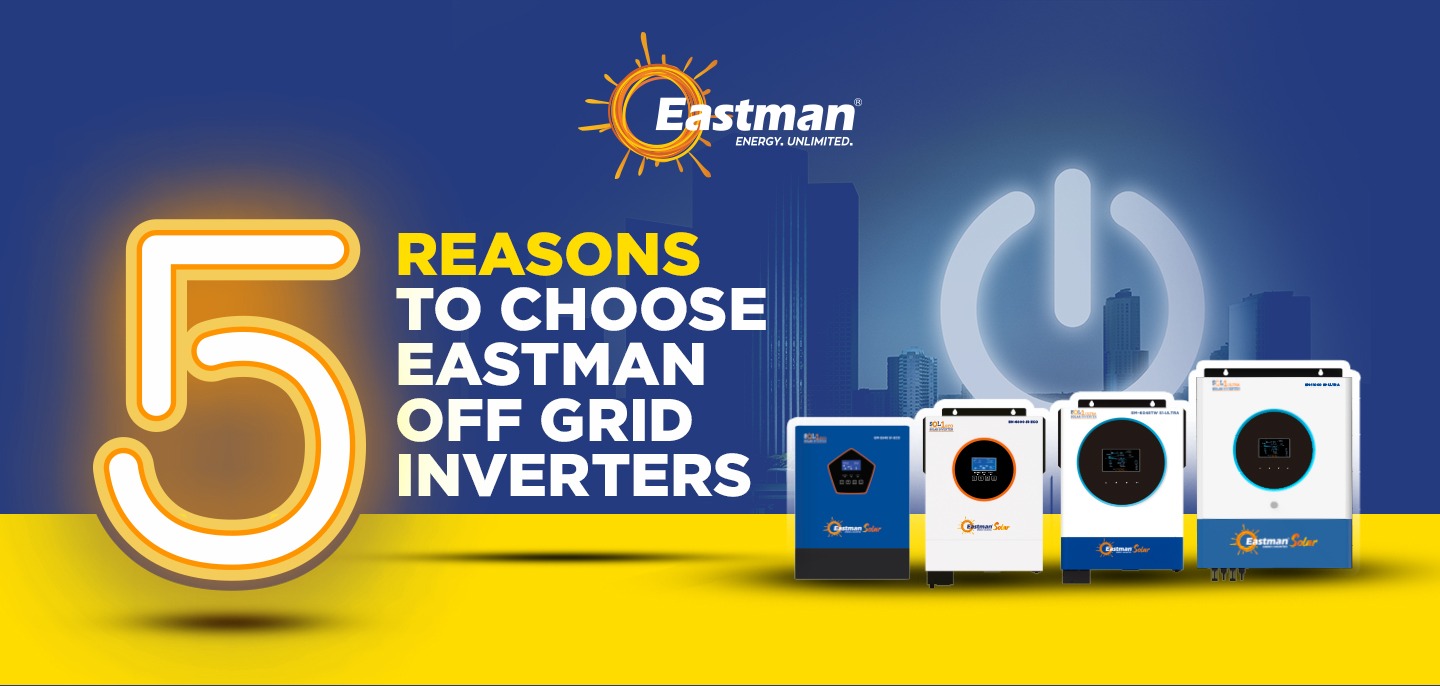
5 Reasons to Choose Eastman Off-Grid Inverters for Your Power Needs
In today's energy-conscious world, off-grid power solutions are becoming increasingly popular for both residential and commercial applications. Among the top options available in the market, Eastman Off-Grid Inverters stand out as a preferred choice for those seeking reliable, efficient, and durable power systems. Let’s dive into 5 compelling reasons why Eastman inverters should be your go-to solution.
1. Better Components: Superior Power Electronics
Eastman off-grid inverters are built using high-quality power electronics components. This isn’t just about reliability, but about superior performance over time. These components are at the heart of the inverter’s ability to manage power flow efficiently, ensuring you get consistent, uninterrupted energy. The robust design ensures fewer breakdowns, meaning less maintenance and more peace of mind.
2. Higher Load Capacity & Enhanced Protection
When it comes to handling large power loads, Eastman inverters excel. Whether you're powering a household, a small business, or even industrial-grade equipment, these inverters have the capacity to handle it all. What's more, they come equipped with advanced protection features to safeguard your system against overloading, short circuits, and other electrical issues. This means your devices stay protected, and your energy flow remains uninterrupted.
3. Higher Efficiency for Optimal Performance
Efficiency is key when it comes to energy solutions, especially in off-grid setups where maximizing power output is crucial. Eastman off-grid inverters boast high energy efficiency, which translates into better performance, less energy loss, and more savings. These inverters are designed to optimize the conversion of DC to AC power, ensuring you get the most out of your solar panels or other renewable energy sources.
4. World-Class Warranty – Best in Industry
When you invest in an energy solution, you want the assurance that it's going to last. Eastman understands this, which is why they offer a world-class warranty—one of the best in the industry. This comprehensive coverage provides long-term security, ensuring that your investment is protected. Whether it’s a minor issue or a significant concern, Eastman’s warranty and customer service team are there to support you.
5. Operates Efficiently in Extremely Harsh Conditions
From extreme heat in desert regions to frigid cold in mountainous areas, Eastman inverters are built to perform under the harshest environmental conditions. Their rugged design and advanced cooling mechanisms allow them to operate efficiently, even in challenging climates. This makes Eastman inverters ideal for remote areas where weather extremes could otherwise affect power reliability.
Conclusion: Power Your Future with Eastman
In the world of off-grid power solutions, Eastman Off-Grid Inverters offer unmatched quality, reliability, and performance. Whether you're looking to power your home, business, or industrial site, Eastman inverters deliver the best in components, load capacity, efficiency, and durability—all backed by a world-class warranty.
When choosing an inverter, reliability, and efficiency are key factors, and Eastman ticks all the boxes. Choose Eastman Off-Grid Inverters today and enjoy a sustainable, uninterrupted power supply, no matter where you are.
Ready to go off the grid? Power your future with Eastman!

5 Reasons to Choose Eastman Tubular Batteries
In today's world, reliable power is essential, whether you're dealing with frequent power cuts or looking to support a renewable energy system. When it comes to backup power solutions, tubular batteries have become the preferred choice due to their durability and performance. Among the leading options, Eastman Tubular Batteries stand out, offering unmatched reliability, efficiency, and value for money. Here are five compelling reasons to choose Eastman Tubular Batteries for your energy storage needs.
1. Low Cost of Ownership
One of the key reasons to invest in Eastman Tubular Batteries is their low cost of ownership. These batteries are designed for long-term use, reducing the need for frequent replacements. Their efficient performance and longevity mean fewer maintenance costs and lower operational expenses over time. Whether you're using them for residential, commercial, or industrial applications, the durability of Eastman Tubular Batteries translates into significant savings. With fewer breakdowns and longer service life, you get excellent value for your investment, making it a cost-effective solution in the long run.
2. Low Water Loss
Battery maintenance can often be a hassle, particularly when it comes to checking and refilling water levels. Fortunately, Eastman Tubular Batteries are designed with low water loss technology, which means they require minimal maintenance. These batteries consume less water compared to conventional batteries, significantly reducing the need for frequent top-ups. This feature makes them ideal for locations where regular maintenance is not feasible, ensuring consistent performance with less effort. The lower water consumption also prolongs the battery's overall life, contributing to its long-term efficiency.
3. Easy Recovery after Idle Period
Eastman Tubular Batteries are engineered to recover quickly after idle periods, making them highly versatile. Whether your battery has been unused for an extended period or has seen limited usage, Eastman batteries can easily bounce back to optimal performance. This resilience is critical in environments with irregular power usage patterns or when the battery is required only as a backup during emergencies. The ability to recover quickly after being idle ensures that you don’t have to worry about degradation or performance loss, making these batteries a reliable choice for various applications.
4. 5% Extra Capacity and Backup
Another standout feature of Eastman Tubular Batteries is the 5% extra capacity and backup they offer compared to standard batteries. This means that in times of extended power outages, you can rely on Eastman batteries for longer backup power. Whether you are powering critical devices in your home or maintaining operations in a commercial space, that extra 5% capacity can make a significant difference. This increased capacity is particularly beneficial for regions that experience frequent or prolonged blackouts, providing peace of mind knowing you have additional backup when you need it most.
5. Longer Life
Longevity is a crucial factor when selecting a battery, and Eastman Tubular Batteries excel in this area. Built with robust materials and advanced technology, these batteries are designed to last longer than conventional lead-acid batteries. The tubular design enhances the battery’s ability to withstand deep discharges, frequent cycling, and harsh environmental conditions. The result is a longer lifespan and fewer replacements, reducing your overall battery expenditure. For anyone seeking a power solution that offers durability and reliable performance, Eastman Tubular Batteries are a top choice.
Conclusion: A Smarter Power Solution
When it comes to backup power solutions, Eastman Tubular Batteries offer an unbeatable combination of efficiency, reliability, and low maintenance. With features like low cost of ownership, minimal water loss, quick recovery after idle periods, 5% extra capacity, and extended lifespan, these batteries are designed to meet the needs of homes, businesses, and industries. Investing in Eastman Tubular Batteries ensures that you not only get exceptional backup power but also long-term savings and peace of mind.
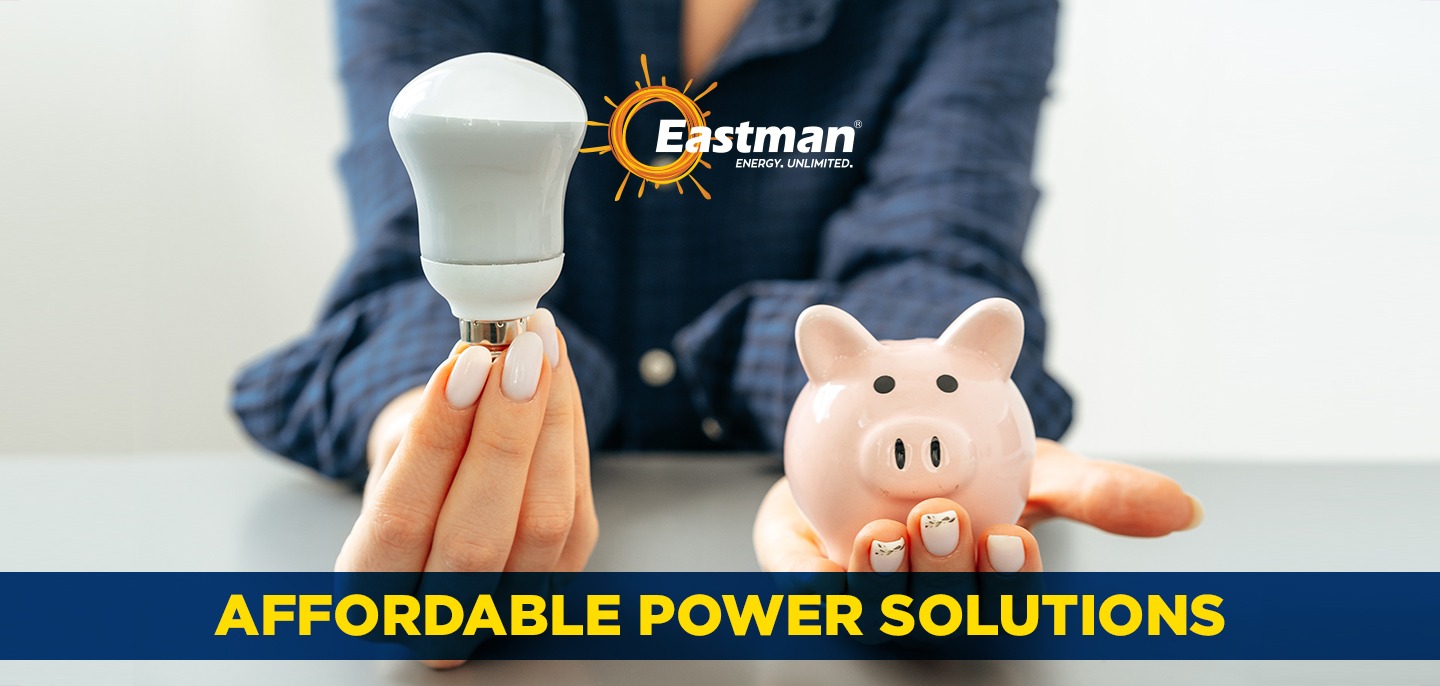
Discover the Affordable Power Solution You’ve been searching: One Stop Shop
In today's fast-paced world, a reliable and affordable power solution is no longer just a luxury—it's a necessity. Whether you're in a remote village or a bustling urban center, power interruptions can disrupt daily life, business, and even critical services. Finding an all-in-one solution for backup power or renewable energy integration is a challenge many of us face. That's where Eastman comes in, offering a wide range of affordable and sustainable products, including tubular batteries, lithium batteries, inverters, solar charge controllers, and solar panels.
Eastman has established itself as a leader in energy solutions, particularly for those seeking durability, efficiency, and sustainability. Tubular batteries, for instance, are known for their long life, durability, and ability to withstand frequent power cuts. These batteries are ideal for homes, offices, and industries that require a consistent power supply. Eastman's tubular batteries provide a longer lifespan compared to conventional flat-plate batteries, delivering high performance even in extreme conditions. They offer an excellent cycle life, perfect for areas with frequent load shedding. These low-maintenance, highly efficient batteries make them a top choice for anyone looking to invest in a reliable power backup system.
Lithium Batteries
Lithium batteries, on the other hand, have revolutionized energy storage with their lightweight structure and high energy density. Eastman's lithium batteries are compact and easy to install, capable of faster charging and discharging, making them suitable for various applications such as solar energy storage, electric vehicles, and portable devices. They are long-lasting, providing up to three to four times the life of traditional lead-acid batteries. As clean energy becomes more vital, lithium batteries are an excellent choice for those seeking to reduce their carbon footprint while ensuring reliable power.
Inverters
Inverters play a critical role in providing seamless power during outages by converting direct current (DC) from batteries to alternating current (AC), which powers most household and commercial appliances. Eastman's inverters are designed to ensure continuous power supply during outages and work efficiently with a variety of battery types, including tubular and lithium. These inverters offer advanced protection against overloads, short circuits, and over-voltage, making them a versatile solution for both residential and industrial needs.
Solar Charge Controllers
For those using or considering solar panels, a solar charge controller is essential for regulating the power flow from the panels to the batteries, ensuring maximum efficiency and preventing overcharging. Eastman's solar charge controllers come with maximum power point tracking (MPPT) technology, which increases energy efficiency by up to 30%. They offer protection against overcharge, reverse current, and overload, thus enhancing the life of batteries. With user-friendly displays and advanced technology, these controllers make solar energy management a breeze.
Solar Panels
Solar panels are a key part of any clean energy solution, and Eastman’s solar panels are designed to harness the full potential of solar energy. These high-quality panels are built with durable materials to withstand harsh weather conditions, and they efficiently convert sunlight into electricity even in low-light environments. Suitable for both residential and commercial installations, these solar panels can help reduce dependence on traditional energy sources. When combined with Eastman’s solar charge controllers and batteries, they create a robust and reliable solar energy system for any home or business.
Eastman: One Stop Solution for Solar Products
The advantage of choosing Eastman is clear. They provide an integrated energy solution that is both affordable and environmentally friendly. By offering a range of products that work seamlessly together—tubular batteries, lithium batteries, inverters, solar charge controllers, and solar panels—Eastman ensures that your power needs are met under one roof. Their products are designed for longevity, giving you value for money while helping reduce your carbon footprint. Whether you're setting up a solar energy system or need a dependable backup power source, Eastman has a solution tailored to your needs.
In a world increasingly demanding reliable, efficient, and eco-friendly power solutions, Eastman has emerged as a leader. Their end-to-end solutions, from tubular and lithium batteries to inverters, solar charge controllers, and solar panels, offer an affordable, sustainable, and dependable way to meet diverse energy needs. There's no need to juggle multiple suppliers when Eastman can provide everything you need under one roof. Make the switch today, experience uninterrupted power, and contribute to a cleaner, greener planet.
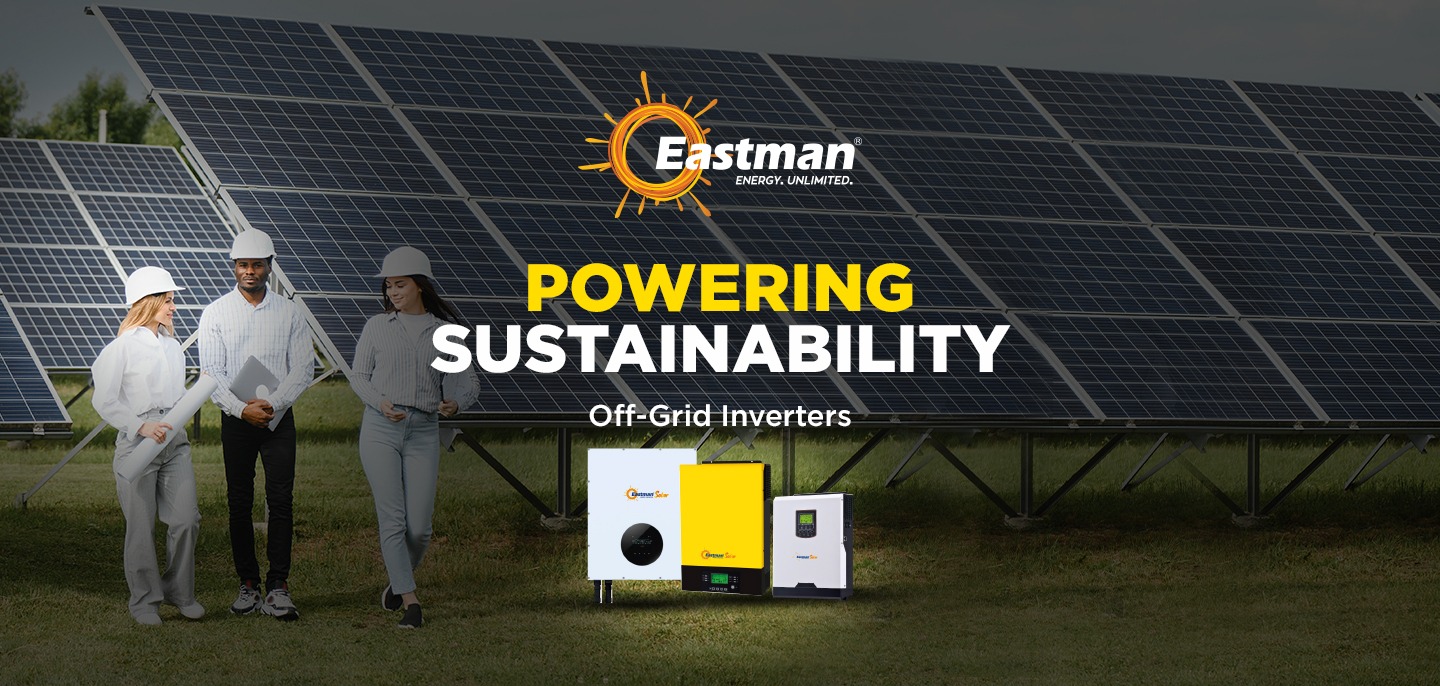
Powering Sustainability: Eastman Off-Grid Inverters as the Future of Energy Independence
In an era where sustainability is no longer a choice but a necessity, innovative energy solutions have become crucial for the growth of communities and businesses alike. Eastman, a renowned player in the power solutions market, has stepped up to meet this demand with its high-quality off-grid inverters, empowering users to achieve energy independence while fostering environmental stewardship.
What are Off-Grid Inverters?
Off-grid inverters are integral to renewable energy systems, converting DC (Direct Current) generated by solar panels or other renewable energy sources into AC (Alternating Current) to power electrical appliances. Unlike grid-tied systems, off-grid inverters work independently from the conventional electricity grid, storing excess energy in batteries for use during non-sunlight hours or power outages.
For areas with unreliable or non-existent grid connections, off-grid inverters are a game changer, offering an uninterrupted, self-sufficient power source.
Why Eastman Off-Grid Inverters?
Eastman’s inverters stand out due to their reliability, durability, and alignment with sustainable energy practices. Designed to function efficiently even in extreme conditions, Eastman off-grid inverters cater to residential, commercial, and industrial applications. Here’s why they are a top choice for those looking to embrace off-grid energy solutions:
1. Cutting-Edge Technology
Eastman’s off-grid inverters integrate the latest technology to ensure seamless energy conversion, battery management, and load optimization. Their inverters support multiple battery types, including lithium-ion and lead-acid, offering flexibility depending on the user’s needs. This adaptability allows users to scale up as energy demands grow, making the system future-proof.
2. High Efficiency
Efficiency is critical in off-grid systems, where every watt of generated energy counts. Eastman’s inverters boast superior energy conversion rates, maximizing the use of solar energy and reducing waste. This high efficiency translates into fewer solar panels and batteries required, optimizing space and reducing installation costs for consumers.
3. Smart Monitoring
With smart technology taking over the renewable energy space, Eastman’s off-grid inverters come equipped with intelligent monitoring systems. Users can remotely monitor energy generation, consumption, and storage through mobile applications, ensuring they always stay in control. This not only enhances convenience but also enables users to detect faults early and perform timely maintenance.
4. Durability and Reliability
Eastman’s off-grid inverters are built to last, providing years of reliable service even in harsh environments. From rural homes to remote industrial sites, Eastman inverters ensure consistent power, reducing reliance on traditional fossil-fuel-based generators that contribute to carbon emissions.
5. Sustainability and Cost Savings
By leveraging renewable energy, Eastman off-grid inverters enable users to significantly cut down on energy costs. Over time, the initial investment is offset by the savings generated from lower electricity bills and reduced maintenance of power infrastructure. More importantly, by shifting away from fossil fuels, Eastman users contribute to reducing their carbon footprint, aligning with global climate goals.
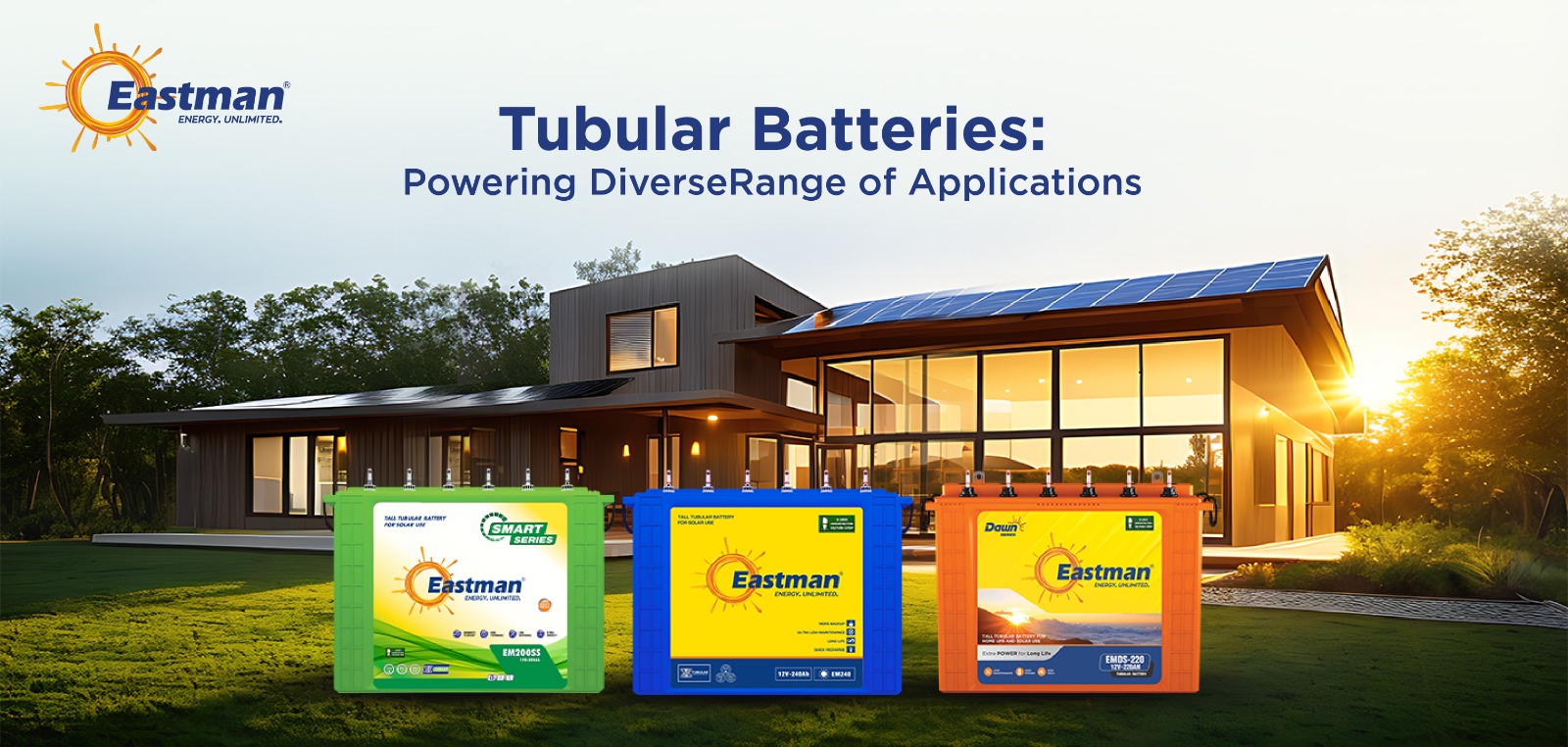
Tubular Batteries: Powering diverse range of Applications
Tubular Batteries have a wide range of applications due to their reliability, efficiency, and long life. Here are some of the primary applications:
1. Inverter and UPS Systems:
· Home Use: Provide backup power during power outages, ensuring uninterrupted operation of household appliances.
· Commercial Use: Support critical business operations by maintaining power supply for computers, servers, and other essential equipment.
· Industrial Use: Ensure smooth functioning of industrial machines and processes during power interruptions.
2. Solar Power Systems:
· Residential Solar Installations: Store energy generated from solar panels for use during nighttime or cloudy days.
· Commercial Solar Setups: Offer reliable energy storage solutions for businesses, reducing dependence on the grid.
· Off-Grid Solar Systems: Essential for remote areas without access to the main power grid, ensuring continuous power supply.
3. Telecommunications:
· Telecom Towers: Provide backup power to ensure continuous operation of communication networks, especially in remote areas.
· Data Centers: Support critical data infrastructure by providing reliable power backup, minimizing downtime.
4. Electric Vehicles:
· Electric Rickshaws: Offer a dependable power source for electric three-wheelers, ensuring longer running times and better efficiency.
· Small Electric Vehicles: Used in various small EV applications, contributing to eco-friendly transportation solutions.
5. Rural Electrification:
· Remote Villages: Enable electrification of rural and remote areas by providing a reliable power source where grid access is limited or unavailable.
· Agricultural Use: Power agricultural equipment and irrigation systems, enhancing productivity and efficiency.
6. Emergency Lighting:
· Hospitals: Ensure that critical medical equipment and lighting remain operational during power failures.
· Public Buildings: Provide emergency lighting and power in schools, offices, and other public institutions.
7. Banking and ATMs:
· Bank Branches: Maintain operations and security systems during power outages.
· ATM Machines: Ensure that ATMs remain functional, providing continuous service to customers.
8. Railway Signaling:
· Railway Stations: Support railway signaling systems, ensuring safety and operational efficiency.
· Trackside Equipment: Provide backup power for trackside signaling and communication equipment.
9. Marine Applications:
· Boats and Yachts: Provide reliable power for onboard systems, lighting, and navigation equipment.
· Marine Navigation: Support critical marine navigation and communication systems.
10. Hospital and Healthcare Facilities:
· Critical Medical Equipment: Ensure continuous power for life-saving medical equipment, enhancing patient care and safety.
· Emergency Backup: Provide backup power for essential lighting, ventilators, and other critical systems,
Eastman Tubular Batteries are versatile and suitable for a wide range of applications due to their deep cycle capabilities, durability, and low maintenance requirements. Their ability to provide reliable and consistent power makes them an ideal choice for both residential and commercial use across various sectors.
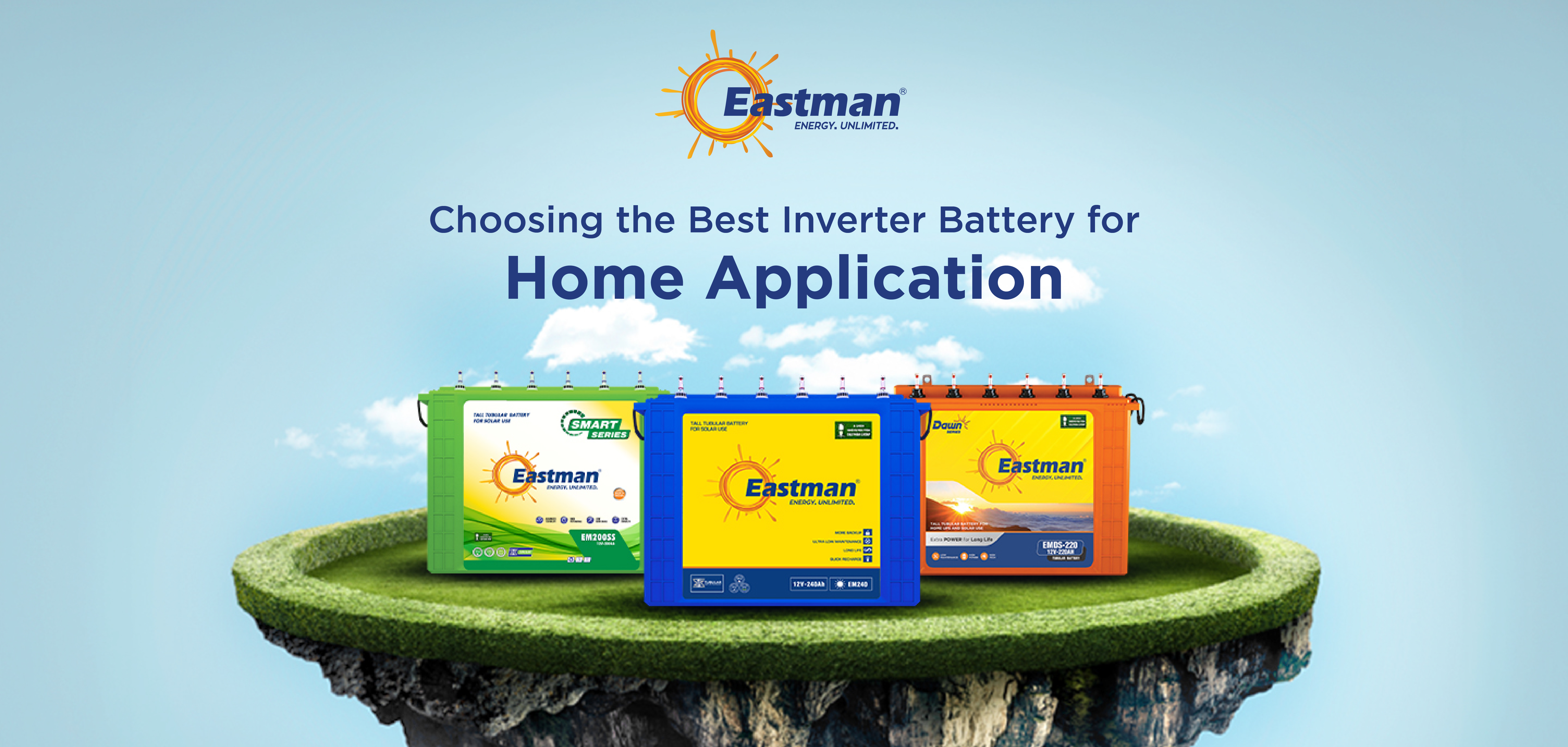
Choosing the Best Inverter Battery for Home Application
An inverter is a crucial device that manages the flow of energy between a home’s electrical system, a battery storage system, and the electrical grid. This device plays an essential role in converting direct electrical current (DC) into alternating current (AC) used in home appliances.
To ensure your home has a reliable power supply, especially during outages, selecting the right battery is essential. This article guides you through choosing the best Tubular battery for your home.
Battery Capacity
Your Tubular battery must have adequate capacity to power your home and meet your energy needs. Here's how to determine the correct battery capacity for your home inverter:
1. Determine Your Energy Needs
You can use an energy monitor to track your energy consumption and get an idea of your daily energy expenditure. Alternatively, check your monthly energy bills for a better understanding of your monthly energy use.
2. Determine the Duration of Backup Power you need
Power outages can last from a few minutes to several hours. To choose a suitable battery capacity, determine how long you will need backup power during an outage.
3. Calculate the Battery Capacity you need
Knowing how much battery capacity you need during power outages or for backup purposes is crucial. For example, if your average daily energy expenditure is 10 kWh and you need backup power for seven hours, you will need a battery with a capacity of 70 kW. Consulting with a professional is recommended to determine the battery capacity that best suits your needs.
4. Choosing the Right Tubular Battery
Selecting the correct Tubular battery for your home inverter ensures optimal and reliable operation during power outages. Lead-acid batteries are the most popular choice for inverters due to their reliability and low maintenance costs. Here are some benefits of lead-acid batteries:
· Versatility: They come in a wide range of voltages (12V being the most common for UPS systems) and capacities. This variety allows you to find the perfect battery for your specific needs. The size and weight increase with the Ah rating, indicating more energy storage and discharge capability.
· Low Maintenance: Sealed lead-acid batteries require less maintenance. They are spill-proof and can be used in any position, making them ideal for many applications.
· Durability: Lead-acid batteries are known for their reliability and ability to withstand harsh conditions. They can tolerate slow or fast charging, occasional overloads, and even extended periods of inactivity without significant damage.
· Long Life: These batteries boast a long lifespan, providing dependable service for many years with proper care.
· Temperature Tolerance: They perform well in a wide range of temperatures, from low to high.
· Low Self-Discharge: Compared to other rechargeable options, lead-acid batteries have minimal self-discharge, meaning they hold their charge for longer periods when not in use.
· Cost-effective in the Long Run: Lead-acid batteries are not the most cost-effective option among rechargeable batteries, but the lesser maintenance cost makes them an excellent choice for budget-conscious users in the long run.
Choosing the Right Brand: Eastman! Customer’s 1st Choice
Selecting a competent battery brand is crucial, as the quality of batteries can vary significantly between brands. Avoid brands that produce lower-performing batteries that offer little value for your money.
Eastman Tubular Battery offers the best inverter batteries on the market. Our clients who have used our products are highly satisfied. You can learn more about our products from our website.
Eastman Tubular Batteries are a type of lead-acid battery known for their durability and efficiency. They are designed with a tubular plate technology, which enhances their lifespan and performance compared to conventional flat plate batteries.
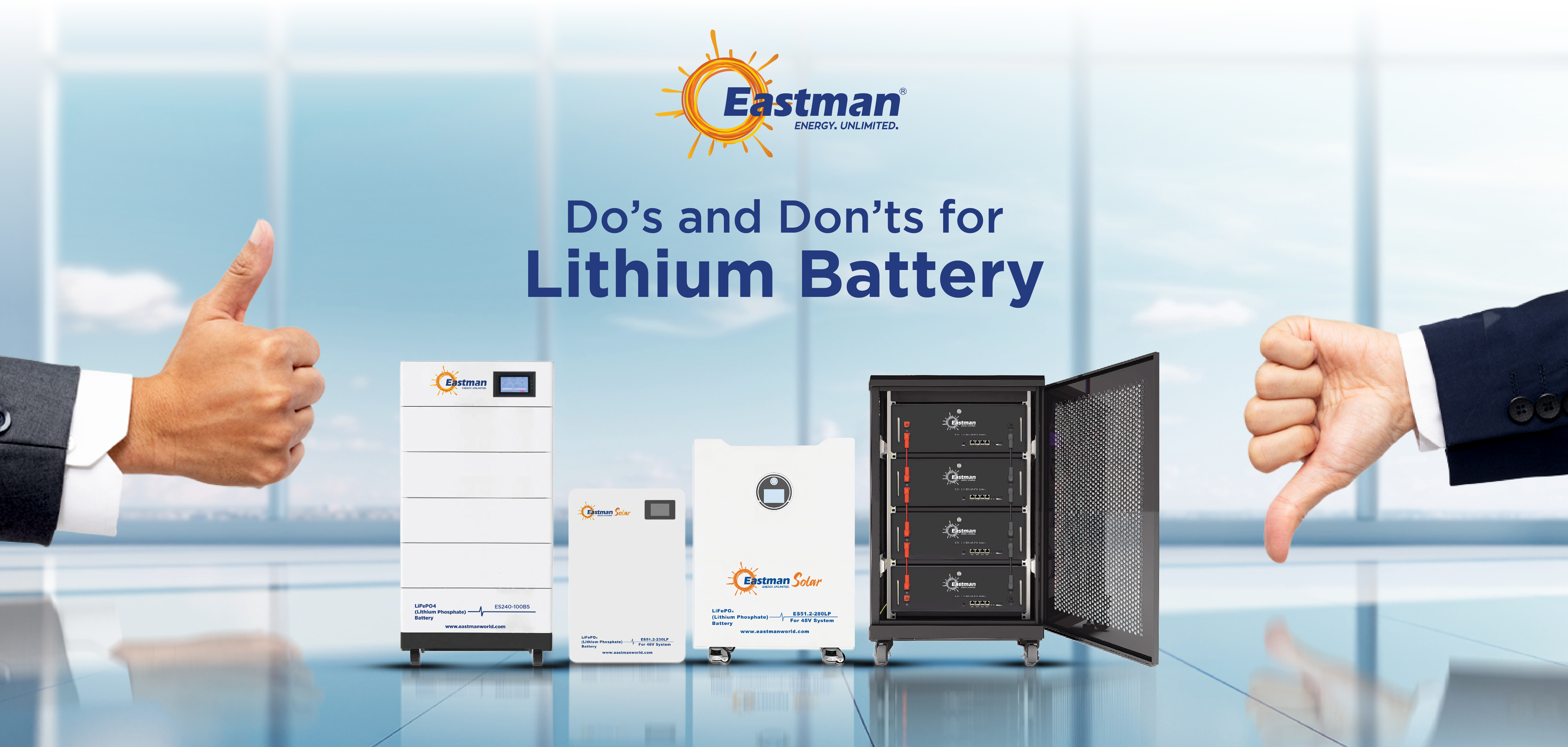
Keep your Energy Storage at Higher Efficiencies with our Do’s and Don’ts for Lithium Battery
Proper maintenance of lithium batteries can significantly extend their lifespan and ensure safe operation. Here are some essential tips for maintaining lithium batteries:
Energy Storage Lithium Battery is mainly used in the field of household power storage. At the same time, it is also suitable for the internal energy storage of RV, Household energy storage and temporary buildings. It adopts high-performance and long-life lithium-ion phosphate battery as the basic energy storage unit, combined with advanced lithium-ion battery management system industrial design of household products and other technologies. Ensure that products have high reliability and high industrialization standards.

By following these tips, you can maximize the performance and lifespan of your lithium batteries while maintaining safety.
At Eastman, we always provide extensive support on usage and guidelines on Lithium Battery. It ensures longer life, Safe Operation & hassle-free energy storage.

Selecting the Right Lithium Battery for Your Residential Backup System
Many homeowners have started using lithium batteries in their residential backup systems due to the increasing demand for reliable and sustainable energy solutions. Longer life spans, more energy density, and a safer life compared with the typical lead acid battery are some of the benefits provided by Lithium Batteries. Below is a comprehensive guide that will assist you with making an informed decision.
Understand Your Power Needs
Before going into the technical details about Lithium batteries, it is important to first consider your home’s power requirements. Calculate all essential devices’ total wattage as well as those appliances that you’d like powered during an outage. This way, you’ll know how much capacity (measured in kilowatt-hours [kWh]) will be needed by your backup system.
Battery Capacity and Energy Density
Battery capacity states how much energy can be stored in a battery usually measured in ampere-hours (Ah) or kilowatt-hours (kWh). Energy density refers to the amount of energy stored per unit of weight or volume. For Residential cases, higher energy density is preferable as it allows for more compact and lightweight systems.
Battery Chemistry
Lithium batteries come in various chemistries, however the most popular is Lithium Iron Phosphate due to its higher life.
Lithium Iron Phosphate (LiFePO4): It is known for its long cycle life, thermal stability, and safety. It’s an excellent choice for home backup systems due to its durability and relatively stable performance over time.
Lithium Nickel Manganese Cobalt Oxide (NMC): It offers high energy density and good overall performance. It’s popular in both electric vehicles and residential energy storage systems.
Lithium Cobalt Oxide (LCO): It has high energy density but less stable and generally not recommended for large-scale residential applications.
Cycle Life
Cycle life refers to the number of complete charge-discharge cycles a battery can undergo before its capacity significantly degrades. For a residential backup system, Cycle life should be at least 4,000 cycles, which ensures longevity and reliability.
Depth of Discharge (DoD)
Depth of Discharge indicates the percentage of the battery’s capacity that can be used without significantly shortening its life. A higher DoD allows to use more of the battery’s capacity. For example, a battery with a 90% DoD can use 90% of its stored energy before needing a recharge.
Compatibility with Inverters and Controllers
Lithium battery that is being installed must be compatible with existing or planned inverters and charge controllers. Some systems are designed to work specifically with certain types of batteries, so compatibility is key to smooth and efficient operation.
Safety Features
Lithium batteries should come with robust safety features such as thermal management, overcharge and discharge protection, and short-circuit protection. These features are vital for preventing accidents and ensuring the safe operation of Energy backup system.
Brand Reputation and Customer Support
Choose batteries from reputable manufacturers with positive reviews and reliable customer support. Good customer service is essential for troubleshooting and maintaining your backup system over its lifespan.
At Eastman, we guarantee a better product with excellent customer support. We are your perfect partner for all your energy requirements right from Batteries, Inverters, Charge Controllers to Solar Panels.